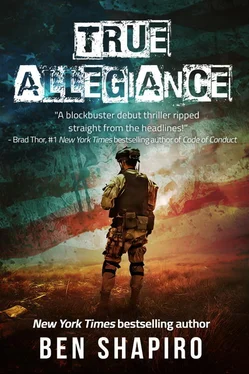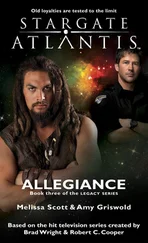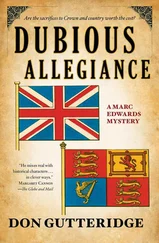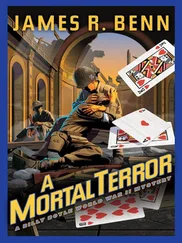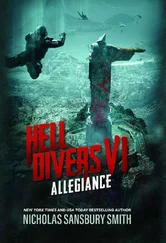Ben Shapiro
TRUE ALLEGIANCE
Prologue

New York City
BY THE TIME JENNIFER COLLIER hit the George Washington Bridge, it was already almost 9:00 a.m. Rush hour. The bridge had turned into an enormous parking lot.
Jennifer looked out at the sea of red lights before her, stretching all the way into New York, and sighed. There had to be thirty thousand cars on this bridge, all of them moving two miles an hour.
Jennifer glanced at her watch and sighed.
She was on the west side of the bridge, and she could see its two enormous steel-encased towers looming before her. In the passenger seat, her daughter, Julie, breathed softly, sleeping.
Jennifer glanced at her watch again. 9:03. “Come on,” she muttered.
Which is when she heard it.
The bridge groaned.
It was a loud, low groan that made the car vibrate.
Julie woke up. “What was that?” she asked drowsily.
The groan died away.
“Nothing,” said Jennifer. “Probably just a plane overhead. Go back to sleep.”
“Mommy…”
The bridge groaned again. This time, it was longer, more drawn out. Jennifer felt the brake pedal vibrate beneath her foot.
“Mommy, that’s not a plane,” said Julie, wide awake now.
The groaning continued, booming from beneath them.
The bridge was undulating slightly up and down now. Jennifer could see the cables of the suspension bridge oscillating like the strings of a guitar.
“Mommy, what’s going on ?” Julie cried.
Cars ahead were honking now, urgently pleading for those at the front of the bridge to hurry up. A few cars were trying to ram their way through the traffic, pushing other cars toward the edge of the bridge. The honking and crashing, combined with the burgeoning low roar, made Jennifer’s head ache, pound, the driving rhythm of her blood surging through her temples.
Then the bridge’s roar stopped again. The people ahead of Jennifer kept honking, panicking, trying to get off the bridge. After about thirty seconds, the honking seemed to die down a little bit. Julie’s wide eyes grew wider. She was staring at a crash on the other side of the divider, the flames leaping from the engine of a smashed Toyota. Jennifer could see a man’s arm hanging, lifeless, out the window.
Jennifer reached out and gripped Julie’s arm. “It’s okay, baby,” she whispered, wetting her lips.
Then time seemed to stop.
The noise of the traffic went silent.
Jennifer’s eyes opened in horror.
The bridge before Jennifer tilted sideways. The 604-foot tower before her began to lean, almost gracefully, to her right.
Jennifer screamed, but it was drowned out in the ear-splitting cracking noise, hundreds of thousands of tons of steel twisting and bending and grating on each other, the sound of a million airplanes all crashing at once. Jennifer looked to her left as she heard the steel cables shriek, stretch on the other side of the bridge. She locked eyes with an elderly man driving a silver Lincoln Continental. Behind him, she saw one of the enormous metal cables snap clean and slither wildly back and forth like a beginning fly fisherman’s messy cast.
“Look out!” she shouted at the man. He couldn’t hear her, but he turned to follow her eyes.
The cable ripped through the Lincoln, slicing its occupant in half vertically, a jet stream of red following in its wake, splattering Jennifer’s windshield.
She opened her mouth to scream and realized that she was already screaming so hard, no sound was emerging.
In front of her, the road itself began to tilt. Cars slid horizontally toward the railings, bath-time playthings of an angry god.
The first tower buckled.
Jennifer felt herself fall as the top level of the bridge dropped. For a moment, she was weightless—the peculiar memory of jumping inside an elevator when she was a little girl flitted through her brain—and then the second level of the bridge slammed down on top of the first level at a twenty-five-degree angle. The tower stopped, bending but holding grotesquely, the metal shrieking and moaning, smoke emerging from below.
Jennifer could hear the screams and cries of the wounded below her, the carnage of metal and bone. An awful crematory smell burned her nose as cars exploded beneath her, one by one, muffled by the tons of cement and steel, sounding for all the world like popcorn. Julie was screaming uncontrollably. In the distance, sirens sounded eerily, and over the river, she could see emergency helicopters approaching.
Jennifer fumbled for her purse and dug through it for her cell phone. She threw aside her wallet, her makeup, poured out the contents on the floor of the passenger seat. Grabbed her cell phone. Speed-dialed Bill.
It rang once. Then twice. Finally, it went to message.
“I love you,” she whispered into the phone.
As she did, Julie pointed through the front windshield, her lips quivering in silent horror.
The second tower was tilting, too.
Like some sort of horrible snake, the bridge responded to the tower. It tilted and keeled over, the road peeling away before Jennifer as it leapt up and to the side. Jennifer saw thousands of cars turn on their sides, rotate like clothes in a washing machine.
Jennifer heard the awful roar, the unnatural screaming of thousands of voices, as the stream of red lights before her began to disappear.
There was nowhere for her to go. She turned to Julie, her eyes round with terror. She grabbed her hand.
“It’s going to be all right,” she whispered. Julie nodded slowly. Jennifer clasped her by the face and looked into her eyes. “I promise you,” she said. “It’s going to be all right. Now, just close your eyes, darling.”
Julie closed her eyes. Jennifer didn’t. She looked into the river below her, saw the disappearing taillights of the thousands of cars descending into the depths of the Hudson.
“God,” she whispered. “Oh, God.”
Part 1
BEFORE

Brett

Kabul, Afghanistan
BRIGADIER GENERAL BRETT HAWTHORNE LOOKED at his M9 magazine and cursed to himself. Empty.
He was sat up against a mud-brick hovel in the city’s poor part of town—even in Kabul, there was a large income gap—and felt the sweat trickle down cold between his shoulder blades. He hadn’t been alone for years—generals always had a personal security detail—but things had gone hellishly wrong.
Hawthorne was a bear of a man, six three in his bare feet and two hundred fifteen pounds in his underwear, with a graying blond crew cut and a face carved of granite. But he had plenty of smile lines. He just didn’t like showing those to people unless he knew them.
He looked up at the Hindu Kush. The city was romantically placed in full view of the mountain chain, a bizarre, large cyst at the bottom of the grandiose peaks. The Kabul River, which once passed lazily through the city, slicing it in half and providing it with an anchor, had dried up to a series of puddles, leaving the city afloat on the steppes.
It was freezing, just like every other December day. What wasn’t like every other day was the silence.
It was quiet, except for a few scattered screams and the occasional rapid-fire rounds. Hawthorne sucked in the smell of smoke with every breath; he could see the Kabul Serena Hotel burning. The new coalition government had bragged about the hotel as the standard-bearer for the modernization of the city, with its historically imitative Islamic architecture, satellite TV, and wireless Internet. Now the flames licked at the windows as ashes floated down on the city.
Читать дальше
